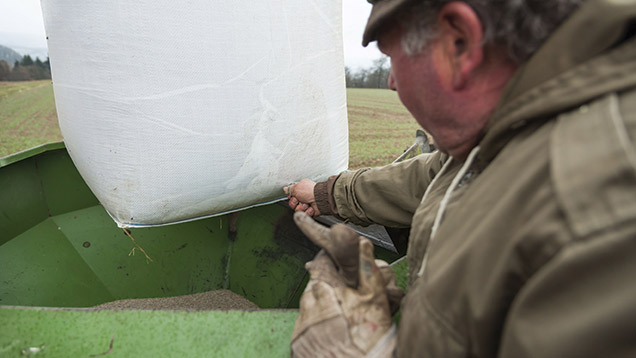Business Clinic: Renting buildings, succession, RTI and workers
 ©WestEnd61/Rex
©WestEnd61/Rex This month, Farmers Weekly’s experts give advice on planning for succession, reporting earnings under RTI, your obligations to retired workers and how to avoid the pitfalls of insurance when leasing farm buildings for other uses.
See also: May’s Business Clinic Q&A
Renting farm buildings to third parties
Q An established business has approached me with a view to renting one of my farm buildings. What do I need to do about insurance?
 Nigel Wellings
Nigel WellingsFounding director,
Farmers & Mercantile
A Farmers and landowners need to fully consider the risk and insurance implications before jumping into any such a venture – they can have serious implications for insurance, not only of the building in question but sometimes for the whole farm.
First, what does the lease or tenancy document say? Most commonly the person letting out a building will be responsible for insuring the fabric of the building while a tenant will insure his property, such as tools and stock, inside it.
It is vital to disclose to your insurer that the buildings are no longer being used for farming purposes and that they will be let.
The occupation of the tenant and the processes being carried out in the let building must also be fully disclosed to insurers.
For instance, if you have let a building to a car repairer that is spray-painting cars, the risk is much increased over, say, the storage of building materials.
Paint spraying carries an explosion and fire risk that insurers will probably want to survey to ensure it is managed properly.
They are therefore likely to charge a much higher rate on a building used for paint spraying than one used for the storage of building materials.
If the building is not fully separated from others it could also affect the premium on other buildings due to potential fire spread.
It is essential that you have discussed with your broker the potential insurance ramifications of any proposed tenant.
As the landlord you must be aware of exactly what your let buildings are being used for. We have come across cases where stolen goods and explosives were being stored and drugs were being produced because the landlord had never inspected the building.
In an extreme case we have seen insurers refuse to insure a whole farm because they are concerned about the risk posed by one tenant.
Another potential problem area is the use of heating by the tenant in a building let as non-heated. The use of portable propane heaters will generally invalidate any insurance policy.
Any form of heating must be disclosed to insurers. Fixed types of heating are commonly acceptable to insurers, however make sure you discuss with your broker.
Gas bottles such as propane and butane are another common problem area. In the event of a fire they can go off like a bomb and the fire brigade will not enter burning buildings containing them, leaving other tenants and perhaps parts of the farm business with little protection. Gas bottles are best stored outside in a lockable steel cage.
You also need to be mindful of waste build-up that tenants might produce – wooden pallets, sawdust and scrap metal are all of concern to insurers as they tend to increase both fire and theft risk.
The last thing that you need is increased premiums or, worse still, your own insurance being invalidated because of a tenant. However, the points above are only an overview of some of the important issues to consider.
The golden rule is to discuss possible ramifications with your broker/insurer before tenants take up occupation and thereafter be aware of their activity on an ongoing basis, including obligating them to notify you of any changes.
Your obligations to retired workers
Q My former herdsman Bob recently retired after being employed on my farm for 40 years. He lives in tied accommodation and I would like advice on what happens next.
Am I obliged to offer him a tenancy, and if so what type? How do I go about setting a rent? I would like to help Bob with advice about housing and other benefits – how best do I do this?
 Peter Cusick
Peter CusickHead of agriculture
and food,
Thrings
Solicitors
A An agricultural worker employed on your farm for the past 40 years and provided with accommodation, usually in a cottage on the farm, will highly likely have acquired rights to remain living in the cottage.
Under the Rent (Agriculture) Act 1976, agricultural workers provided with accommodation as part of their employment acquire long-term security of tenure to enable them to remain living in the accommodation.
The Act is designed to provide housing protection to agricultural workers through their working lives and into their retirement.
The rules on whether a person has acquired this long-term protection are complicated and must be checked.
Broadly, your former herdsman will be a protected occupier if four conditions are satisfied: 1) you own the cottage; 2) he has been living in it with exclusive possession – not sharing with you, for example; 3) he has worked full-time (at least 35 hours a week) in agriculture for at least 104 weeks; and 4) his employment began before January 1989.
This means that Bob still has a right, if he wishes, to remain living in the cottage unless, or until, you have a ground for possession – it would be the same if he had been made redundant or dismissed. He will occupy the cottage as a statutory tenant and you will become his landlord.
Traditionally, agricultural workers do not pay rent during their employment but it is acceptable for you to ask for a rent if he chooses to remain living in the accommodation at the end of his employment.
The rental will be a registered fair rent, which is less than the market rent and must be registered through an application to the Valuations Office Agency rent officer on form RR1C. The rent officer would visit the property to inspect it and set the new fair rent.
If Bob cannot afford the fair rent he can apply to the local housing authority for housing benefit.
If, on Bob’s death, he has a surviving spouse living with him immediately before his death, she would succeed to the statutory tenancy, also paying a fair rent.
There may be a second succession to a family member if that person lives in the house with Bob at the date of death and for at least two years prior to his death.
If that condition is satisfied then, for example, a son or daughter would succeed to a tenancy – not a statutory tenancy but an assured agricultural occupancy under the Housing Act. This requires the successor to pay a market rent.
If you wish to regain possession of the cottage, then you would need to establish a ground for possession, such as non-payment of rent arrears.
Although not directly raised in your question, there is an alternative ground for possession (with its own rules and complications) if you needed the cottage for a current employee.
How to report earnings under RTI
Q I am a director of a family farming company – with no PAYE or NI to pay, do I still have to submit payment information under RTI?
 Mike Butler
Mike ButlerPartner,
Old Mill
A Yes – but only if you are earning in excess of what is known as the lower earnings limit (threshold of £111/week or £481/month).
The disclosure required is an electronic submission that will need to be made to HMRC when you make the payment. If you are paid more than £111/week but less than £7,956/year, you are entitled to a national insurance credit, which needs to be claimed through RTI.
Unlike other employees, directors can be paid in one lump sum up to £7,956 without any national insurance having to be paid.
The disclosures, which used to be made through the annual P35 return, are very much a thing of the past
. Now, failure to report under the RTI scheme will result in a late filing penalty of £100/month for up to nine employees (penalty increasing by £100/banding of employees thereafter) from 6 October 2014, with additional penalties being charged where the submission is later than three months.
There is currently a relaxation on these rules but it is highly recommended systems and processes are put in place sooner rather than later.
Help with succession planning
Q We are an ageing owner/occupier husband and wife partnership and, having no family, are considering offering a share farming agreement as a route to succession. It would offer us semi-retirement while still being involved, which appeals to us greatly.
We wish to continue our life’s work of establishing a pedigree North Devon cattle herd and running a commercial sheep flock.
 Ashley Lilley
Ashley LilleyAssociate director
agribusiness,
Savills
Advertising directly would be too public for us – how do you suggest we go about this and how do we make it work?
What are the key elements we should consider in an agreement and in choosing our share farmer? What else should we take into account?
A Be clear about your goals from the outset. Decide what level of physical and management involvement you wish to have in the future and establish what you need or ideally would like to earn from the arrangement in financial terms.
Is there existing business debt that you either expect the new entity to take over or need to service out of your return?
How will future working capital requirements be funded? Involve your accountant and a solicitor well versed in farming agreements early on as there will be taxation and financial implications to deal with.
Agree which type of farming agreement is right for you: contract farming, share farming or a farming partnership.
Beware of tax on your property. To mitigate the chances of paying inheritance tax, it is vital that the chosen agreement type is bona fide and not actually a tenancy.
This is important because if a tenancy is created (whether formally or not) you will no longer be in common occupation of the farmhouse and the land, which is a condition to achieve agricultural property relief from inheritance tax.
Other considerations include who is going to be responsible for the basic payment claim and managing the livestock records? Also, is the successful candidate eligible for the Young Farmer scheme?
There are ways of advertising the opportunity that can protect your privacy, such as through an agent or a PO box number.
If you really don’t want to advertise there are other avenues worth exploring such as National Federation of Young Farmers’ Clubs, the Fresh Start Academy, Agricultural Colleges or the NFU.
Once you have a shortlist of potential partners, the single most important criteria is whether the personalities can work together.
Before drawing up the formal agreement I recommend setting out some clear heads of terms to include roles and responsibilities, financial/capital contributions and aims for the business. That way you can establish whether the key elements of the agreement are fair and equitable to both parties.
Assuming you are providing the land and the buildings, will you retain ownership of the livestock or sell them to the new business partner at the outset or allow them to build up a share in the livestock over time?
My top tips:
- Be clear about what you want from the outset, this will reduce the likelihood of misunderstanding in the future.
- Take the necessary professional advice.
- Ask yourself are we the right personalities to go into business together?
- Create a legally binding agreement, just in case there is a future dispute, which sets out clearly the responsibilities of each party.
The information provided in these articles does not constitute definitive professional advice and is provided for general information purposes only.
Do you have a question for the panel?
Outline the issue in no more than 350 words and Farmers Weekly will put your question to a member of the panel. Please give as much information as possible and send your inquiry to Business Clinic, Farmers Weekly, RBI, Quadrant House, The Quadrant, Sutton, Surrey SM2 5AS. You can also email your questions to fwbusinessclinic@rbi.co.uk or post your question as a comment below this story.

